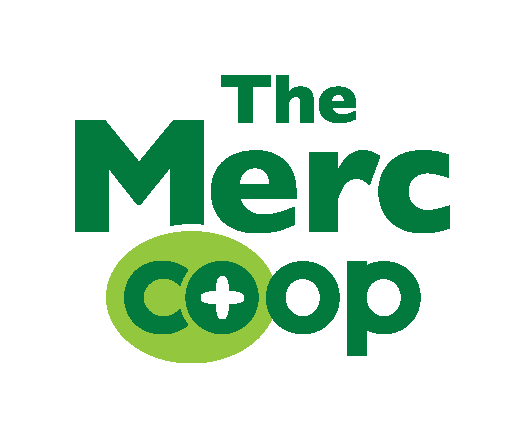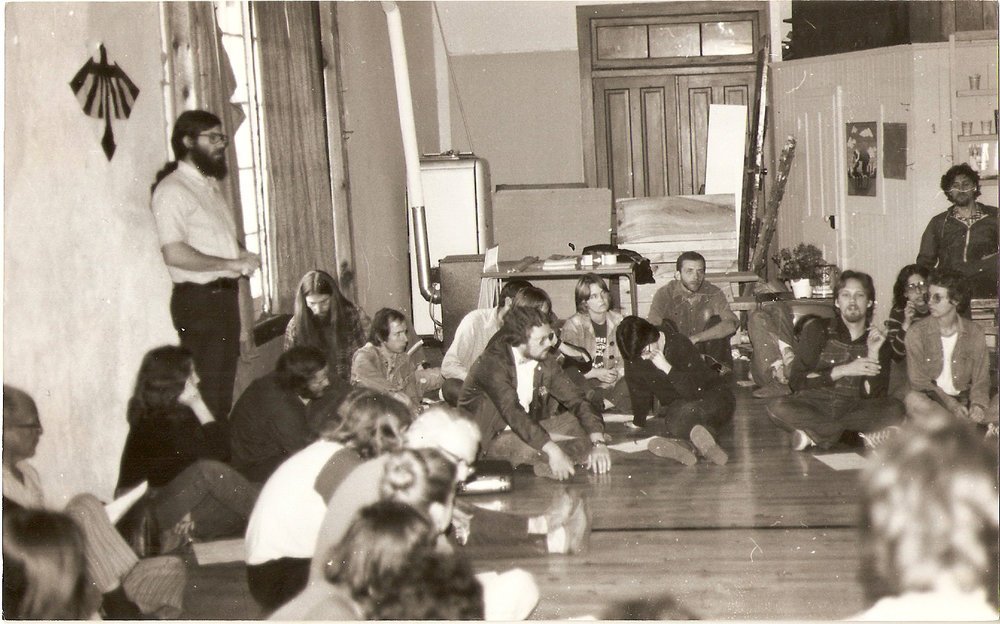Our History
The Merc Co+op began in 1974 by a group of Lawrencians with a shared passion for community access to affordable, local whole foods. In those early days, folks had formed buying clubs to purchase bulk quantities of eggs, milk, fresh produce, grains and more. Each member had access to foods they wanted that weren’t readily available at the time, and they saved money getting them!
After operating out of basements and backrooms, the buying clubs united and formed a democratically-run, cooperative enterprise called The Community Mercantile. The first storefront opened in 1975 in downtown Lawrence with just one employee and a committed group of volunteer member-owners.
Their dedication laid the foundation for the more than 9,900 owners today to participate in a business that puts people before profit and supports a vibrant local food economy.
Over the last 50 years, The Merc Co+op has grown from a staff of one to nearly 100 employees. The vision of increasing access to healthy, local and affordable food across our regional community continues to guide us today.
“When you have a co-op, you really have more than a place to buy food. It is a symbol of responsibility in the community…[co-ops] strive towards providing goods for human betterment." Jim Mayo, KU Professor; excerpted from the Oral History of the Community Mercantile
Hungry for more?
Explore the co-op’s history with the timeline below!
Check out this transcript of the Oral History of the Community Mercantile, compiled by Tom Kreissler, with interviews from dozens of community members that contributed to the success of the co-op.
The Merc Archives is a collaborative website project operated by Dan Bentley, longtime co-op owner and local historian. The site features a vast collection of photos and transcripts of the co-op's history gathered by and from a number of owners and employees.
See the slideshow from the Watkins Museum of History Exhibit Reception.
1970s
1974
There are two cooperative buying clubs in Lawrence: Food Conspiracy and The Oread buying club. Countercultural ideology unify some members, but overall the goals of the clubs are similar: consistent, affordable access to whole foods in an uncertain political time.
Recalling the beginning of the co-op in a newsletter article in 1982, Molly wrote: "In the fall of 1974, Judy Kroeger, owner of the Mercantile Grocery Co. and I talked a lot about the co-ops... We both had been active in co-ops before and were enthusiastic about the philosophy. Both buying clubs [in Lawrence] sold mostly produce and dairy, and we sold mostly dry goods and cheese at the Mercantile. ‘Wouldn’t it be great to get it all in one place?,’ we thought.” Later that year, Judy worked with the Oread buying club who began distributing produce, dairy, and bulk foods out of the 10’ x 10’ back room of the Kroeger’s grocery store.
Simultaneously, a series of public meetings begin in South Park that help to unify folks already participating in the buying clubs and others interested in food co-ops. As recorded in the Community Mercantile Oral History Project, Molly said, “I remember finagling…I think everyone [in the buying clubs] wanted to move it out of their basement or out of their car. Nobody wanted to keep doing it that way, yet there were attachments about ‘my buying club’… it was going to become ‘our store.’ When I look back, there’s this incredible trust. There was very little of ‘how am I sure this is going to happen?’ People rose to it.”
Kansas law is not suited well-suited for consumer-owned cooperatives, so members incorporate as a for-profit organization for the sake of ease. Member Charlie Gardiner recalled “The goal of this for-profit corporation was not to increase the net capital worth of its incorporators but simply to continue to exist to serve the community.”
The co-op is born!
1980s
1990s
1992
In an article by Kathleen Stolle for Telegraphics in July, 1992, “According to The Board of Directors, the Mercantile recently signed a lease agreement with the owners of the vast structure, located just north of KU’s Memorial Stadium. The challenge now is raising the $250,000 for renovation. ‘It is imperative we raise $250,000 from the community in order to provide a complete natural foods market with a service baker, deli and meat counter, in addition to a full-line retail grocery,’ said Amy Fields, Mercantile general manager. ‘This is definitely the biggest project that the Community Mercantile has ever undertaken, and we’re counting on the whole community.’”
The co-op raises the funds through a variety of events, owner drives, and owner loans.
This year, the co-op incorporates. At the time, the state of Kansas did not have provisions for consumer cooperatives as businesses.
1996
Facing competition from the newly opened Wild Oats Market in downtown Lawrence, the co-op narrowly escapes bankruptcy and quickly recovers when Wild Oats abruptly closes this year. In an interview with Lisa Nieman for the New Hope Network, the store’s General Manager Jeanie Wells says, “"I know that the community was really trying to support us … because they continued to shop our store when we really struggled … The shelves were sparsely stocked, the store was inadequately staffed, etc. We knew that we were perceived as David against Goliath and people really wanted to support us because we were the locally owned underdog."
1999
The Community Mercantile Education Foundation (CMEF) is established as a 501(c)(3) non-profit sister-organization to further the co-op’s education and outreach goals.
2000s
2001
With 1,500 member-owners and $5.2 million in sales, The Community Mercantile moves to its current location at 901 Iowa in Lawrence, formerly Rusty’s Grocery. Co-op staff and owners symbolically march up the 9th street hill from the old location to the new, with groceries in hand, to open the new location. The 18,000-square-foot building allows the co-op to provide full-service grocery operations, including a meat and seafood department and an on-site classroom.
2007
Based on member surveys, employee ideas, help from outside consultants, and guidance from the Board of Directors, the co-op renovates the entire store — expanding the deli, cheese, bakery and the seating area, revamping its classroom and rebranding to The Merc Community Market and Deli. The completion of the remodel prepares the co-op for increased competition with the construction of a Wal-Mart Supercenter on South Iowa. An article in the Lawrence Journal World illustrates the shifting environment for the natural foods market.
2008
The MercShare ownership subsidy and discount program is established to allow the co-op to reduce the cost barriers to ownership. The program launches through a generous gift by co-op owner and board member Carol Nalbandian.
2010s
2015
Faced with new competition, the co-op springs into action, rebranding and renovating the store including energy efficiency upgrades. Funds for the renovations are gained, in part, through an owner loan drive, which raises over $327,000. To create a more cohesive brand and to tout the cooperative difference, The Merc Community Market and Deli becomes The Merc Co+op and aligns itself with the National Cooperative Grocers (NCG) brand, acting a pilot location for all the branded materials NCG develops as part of their “Stronger Together” campaign.
2017
The co-op becomes a livable wage employer, increasing wages at the co-op for 82% of employees, using NCG's Livable Wage and Benefits Model. Around 100 employees work at The Merc Co+op.
2017–2018
In October 2017, the co-op embarks on what is Lawrence’s largest solar energy project to date. Through a full rooftop array, two solar covered carports and a solar covered patio, the store installs 688 high performance solar panels to provide 29% of their energy each year.
2019
The Merc Co+op signs an agreement with The Unified Government of Kansas City, Kansas/Wyandotte County (UG) to open a 14,000 square foot grocery store at 5th & Minnesota in downtown KCK. The groundbreaking ceremony takes place August 15, 2019 and the store opens in late July 2020.
2020s
2020
The COVID-19 pandemic begins in February of 2020, with impacts for years to come. The co-op opens second full service grocery store at 501 Minnesota Ave. in Kansas City, Kansas after 46 years of operating in Lawrence. There are 15 full time staff.
2021
The co-op receives grant funding to renovate the Lawrence location, adding accessible restrooms, self-check out stations, new refrigerators and freezers, and more. The project is completed in 2025.
Local artist JT Daniels is selected by a panel of KCK community members to complete a mural at the 501 Minnesota location. The mural is inspired by community input gathered through surveys and coloring sheet submissions.
2023
The Merc Co+op is selected to receive a mural with Fairtrade America’s annual ‘We Are Fairtrade’ campaign, generating broader awareness of Fairtrade certified products.The mural is designed and installed by local IT-RA Icons and features farmer Joselinda Manueles, a producer for Kicking Horse Coffee in Honduras. Learn more about murals at locations past and present!
2025
After half a decade of operation, the Kansas City, Kansas location closes due to financial performance. The co-op focuses on supporting staff and community partners at the location through the last day of operation.
Thank you to the more than 9,900 owners that have invested in our co-op, to our owner Board members who act as stewards of the co-op and its mission, to staff throughout the decades who have worked to fulfill the vision of the co-op, and the shoppers who continue to choose The Merc Co+op as their source for good local food. Here’s to 50 more years!
The Merc Co+op's annual Impact Reports are published each November. Each report is a comprehensive review on the co-op's activities throughout the preceding year. Impact Reports are intended to give shareholders and other interested people information about our activities and performance as a business.























































